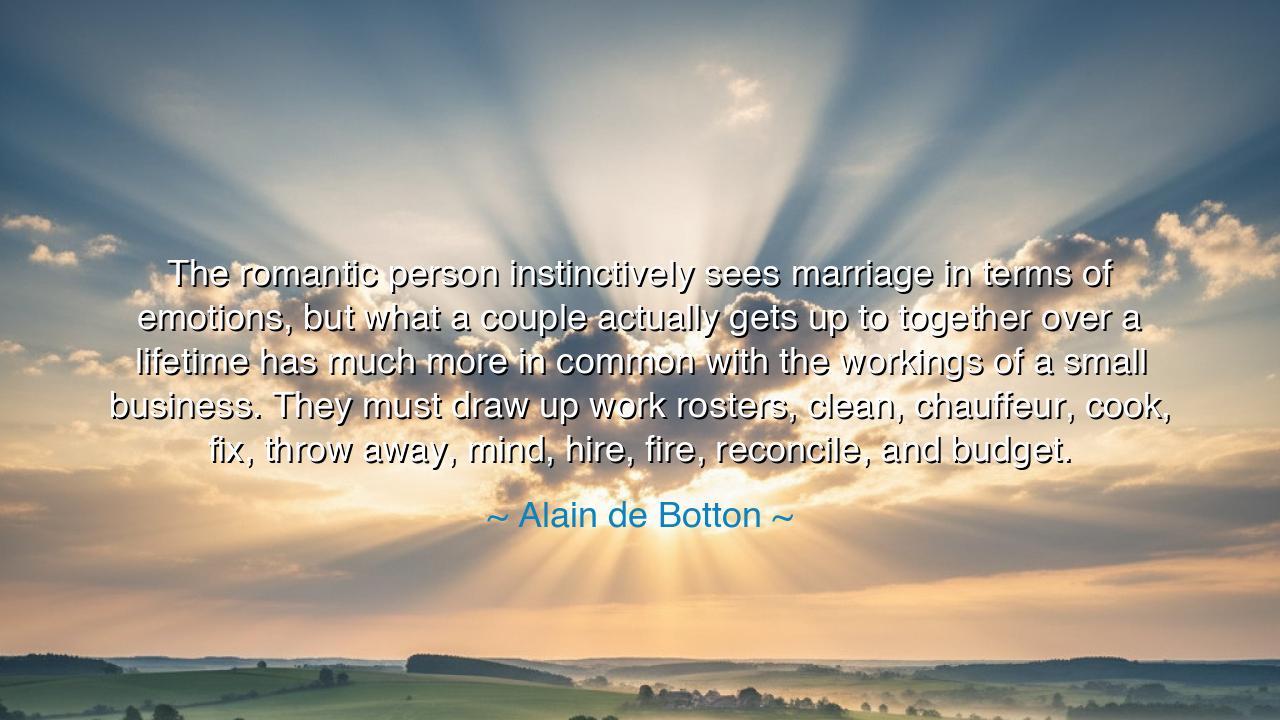
The romantic person instinctively sees marriage in terms of
The romantic person instinctively sees marriage in terms of emotions, but what a couple actually gets up to together over a lifetime has much more in common with the workings of a small business. They must draw up work rosters, clean, chauffeur, cook, fix, throw away, mind, hire, fire, reconcile, and budget.






When Alain de Botton wrote, “The romantic person instinctively sees marriage in terms of emotions, but what a couple actually gets up to together over a lifetime has much more in common with the workings of a small business. They must draw up work rosters, clean, chauffeur, cook, fix, throw away, mind, hire, fire, reconcile, and budget,” he offered not cynicism, but clarity. In these words lies a profound truth about the nature of love — that it is not sustained by feeling alone, but by discipline, cooperation, and humility. De Botton, the philosopher of the everyday heart, sought to dispel the illusions of modern romance — those shimmering dreams that promise eternal passion without labor — and to replace them with a vision both more humble and more enduring.
The origin of this quote lies in de Botton’s lifelong reflection on love, found throughout his works such as Essays in Love and The Course of Love. He writes as one who has seen the aftermath of idealism — the crumbling of relationships built only upon passion, and the quiet triumph of those built upon partnership. His comparison of marriage to a “small business” is not to diminish its sacredness, but to ground it in reality. For what is a marriage if not an enterprise of two souls managing the shared responsibilities of existence? The ancients might have called it a household economy — a living harmony of effort, patience, and daily care.
To the romantic, marriage is a symphony of emotion, a world of moonlit walks, endless understanding, and eternal adoration. But to those who have lived within it, love reveals another face — not less beautiful, but more human. It is the steady rhythm of everyday tasks, the countless negotiations, the unspoken agreements that hold life together. When de Botton speaks of “cleaning, cooking, reconciling, and budgeting,” he reminds us that love must descend from the clouds and take root in the soil. The ancients would have understood this well, for even they knew that the hearth, not the battlefield or banquet, was where the strength of a nation began.
Consider the story of Marcus Aurelius and Faustina, whose marriage has been remembered not for its perfection but for its endurance. The emperor, philosopher, and soldier often wrote of patience, duty, and understanding within relationships. Though history hints that their marriage was not free of strife, Marcus never ceased to honor her as his companion in duty and in daily life. His reflections echo de Botton’s wisdom: that love is work — the most sacred kind of work — a labor that refines the soul as fire refines gold. In this sense, marriage is less an idyll than a discipline, one that demands the virtues of industry, forgiveness, and endurance.
De Botton’s insight challenges us to see that the emotion of love is only its beginning, not its foundation. Feelings rise and fall like tides; what sustains love is the will to remain kind in the face of irritation, to continue building even when the heart grows weary. The comparison to a business, then, is not cold but practical: it speaks of shared labor, division of duties, the necessity of communication and reconciliation. Those who believe that love should be effortless will soon feel betrayed by its demands. But those who understand it as a daily practice will find in its labors a quiet and lasting joy.
In truth, the romantic myth has done many a lover harm. It teaches that happiness is spontaneous and passion eternal, yet real love is an achievement — a structure built plank by plank over years of compromise and care. To live well with another person requires not constant delight but constant devotion. It asks us to become artisans of the ordinary, to find holiness in chores, meaning in schedules, and tenderness even in the dull repetitions of life. For when two people labor side by side with understanding, they transform drudgery into intimacy — and the ordinary becomes divine.
So let this wisdom be passed down: marriage is not a poem; it is a workshop of the soul. To love is to build, to repair, to plan, to forgive, and to begin again — a thousand times over. Let no one despise the daily work of love, for in that work lies its beauty. Passion may ignite the bond, but partnership sustains it. Therefore, approach love not as a dream to be enjoyed, but as a craft to be mastered. Draw up your rosters, share your burdens, tend to the small things together — for it is in those small things that eternity hides. And when emotion fades, as all fires do, you will find that the steady warmth of effort is the truest light of love.






AAdministratorAdministrator
Welcome, honored guests. Please leave a comment, we will respond soon